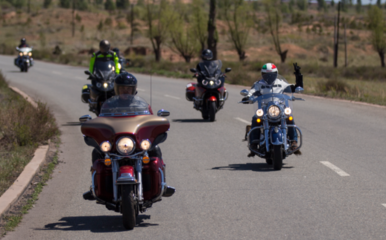
The Dynamic Relationship Between Motorcycle Clubs and Their Communities
CustomStoreMCBiker
Motorcycle clubs (MCs) have long been an integral part of the cultural fabric in many communities around the world. While often perceived as mysterious or rebellious, MCs contribute significantly to their local communities through charity events, economic support, and civic engagement. This article explores the symbiotic relationship between motorcycle clubs and the communities they reside in, highlighting the ways they give back, foster unity, and shape local culture.
The Role of Motorcycle Clubs in Community Building
Motorcycle clubs are not just about riding; they represent a brotherhood or sisterhood bonded by shared interests, values, and respect for the open road. Many MCs are deeply rooted in their local areas, fostering a strong sense of belonging and solidarity among their members. Through organized events, fundraisers, and outreach programs, these clubs actively contribute to the well-being of their communities.
Charity and Philanthropy
One of the most visible ways MCs engage with their communities is through charity work. Many clubs host annual fundraising rides, toy runs, and benefit events to support causes such as veteran assistance programs, children’s hospitals, cancer research, and disaster relief. For instance, the well-known "Toys for Tots" motorcycle runs organized by various clubs help collect gifts for underprivileged children during the holiday season. Similarly, many clubs participate in fundraising rides for fallen officers or military personnel, showcasing their commitment to giving back.
Economic Impact
Motorcycle clubs also contribute to local economies in significant ways. Events such as bike rallies, poker runs, and club-organized festivals attract riders and enthusiasts from different regions, bringing business to local hotels, restaurants, and shops. Additionally, many MC members support small businesses by purchasing gear, accessories, and maintenance services locally. Some clubs even establish their own businesses, creating jobs and fostering entrepreneurship within the community.
Community Engagement and Civic Involvement
Beyond charity and economic contributions, MCs engage in direct community service. Members often volunteer for neighborhood clean-up initiatives, mentorship programs for at-risk youth, and safety awareness campaigns. Many clubs also work alongside law enforcement agencies to promote responsible riding and advocate for biker rights. These efforts help bridge the gap between bikers and the broader community, countering negative stereotypes and fostering mutual respect.
The Cultural Influence of Motorcycle Clubs
Motorcycle clubs contribute to the unique cultural identity of a community by promoting a sense of tradition, style, and camaraderie. Their presence can be seen in local parades, music festivals, and car shows, where they showcase custom bikes, unique club patches, and vintage motorcycles.
Preserving History and Tradition
Many MCs have rich histories that span decades, and they take pride in preserving their heritage. Some clubs maintain museums, archives, or historical documents related to motorcycle culture, sharing their passion with the public through exhibitions and storytelling events. This dedication to history ensures that the legacy of MCs remains alive for future generations.
Promoting Motorcycle Safety and Awareness
A significant aspect of MCs' community engagement is promoting road safety and awareness. Many clubs organize workshops on safe riding techniques, proper gear use, and road-sharing education. By advocating for motorcycle-friendly laws and road improvements, MCs contribute to creating a safer environment for all riders.
Overcoming Misconceptions and Strengthening Community Bonds
Despite their positive contributions, motorcycle clubs sometimes face misconceptions fueled by media portrayals of outlaw groups. While some MCs operate outside of legal boundaries, the majority are law-abiding organizations dedicated to community service and brotherhood.
Changing Perceptions
Public outreach efforts, such as open-house events, charity rides, and social media engagement, help MCs demonstrate their positive impact. When communities witness firsthand the dedication and generosity of bikers, preconceived notions begin to change, fostering a more inclusive and accepting environment.
Strengthening Local Relationships
Building strong relationships with local authorities, businesses, and residents is crucial for MCs to continue their mission. By maintaining open communication and collaboration, clubs can ensure their activities are welcomed and supported by the community.
Conclusion
Motorcycle clubs play a vital role in the social and economic landscape of their communities. Through charity work, economic stimulation, cultural contributions, and civic engagement, they foster strong community bonds and challenge negative stereotypes. By recognizing the positive impact of MCs, we can appreciate their role as more than just riders—they are guardians of tradition, champions of charity, and pillars of community spirit.









